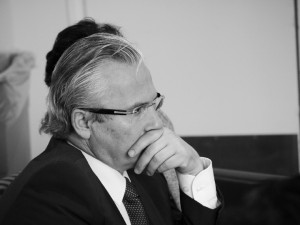Media cover upcoming Garzón trials
The international media are gearing up for the upcoming two trials of Judge Baltasar Garzón. “Is it Crash and Burn Time?” Daniel Woolls asks, writing for the Associated Press:
On Tuesday, Garzon goes on trial for allegedly ordering illegal jailhouse wiretaps in a domestic corruption probe. A week later he appears in court to face charges he overstepped his authority in the Civil War case. Supporters say he’s the victim of a witchhunt by courthouse colleagues jealous of his fame and of arch-conservatives angered by his attempt to revisit Spain’s war-time past. … Garzon doesn’t face jail time if convicted in either trial. But he can be removed from the bench for up to 20 years, which at his age — 56 — would in effect end his career as an investigating magistrate at the National Court.
Meanwhile, support for the embattled judge is building, from manifestations in Spain to Human Rights organizations. More here.














Judge Garzón has been accused of everything from a megalomaniacal obsession to charading as a jurist while being a proxy for a Communist front. Fortunately, this is a person whose depth of commitment overshadows pedestrian arguments about his motives. And they are pedestrian arguments. They are hackneyed, unsubstantiated, and strike a malingering uncomfortable feeling among Spanish left and right that their history in the twentieth century will not leave them alone. These arguments also throw into relief the career of a person who has committed himself to absolute justice, something long forgotten and washed away under the bridge of the “Pact of Silence” that brought us Spain’s ” miraculous” transition to democracy.
But could you blame the Spanish for not pursuing what the judge has pursued, even those who knew too well the destruction, the horror, and the degradation that the regime of Francisco Franco accomplished? Who would trade years of post ´Franco retribution for the years of harmony the Spanish democracy has achieved? But, of course, that is precisely what Spain has done. It has traded the memory and the ownership of the vengeance and terror and retribution that the Franco regime represented itself for what it now has. It does not matter if it all looks good on paper. In the end, history will not be denied, no matter how adept the regime was at rewriting it and the toll is coming due.
There is probably only one other comparison one could make to the crimes – social, cultural, and physical – committed by the Franco regime. It is not that of the Jewish Holocaust, but it was a holocaust nonetheless. The finessing with good reason that historians and social commentators are obligated to do when making comparisons between the Jewish Holocaust and other incidents of terror in the twentieth century is necessary. The terror and horror and abject lack of respect for human life and purpose is often just too much to comprehend and even harder to explain. One should not throw around comparisons to that horror lightly. And yet, if there was ever a lesson to be learned on the surface and in its depths from the Jewish Holocaust it is that it was human beings, not militarists, not totalitarians, not racists, not rich, not poor, not Christians, not Muslims, not Americans, not white, not black that did this. It was humans. It was you and me. You are the holocaust, any holocaust, and so am I. For the Spanish to face theirs, they are going to have embrace it and see its historical place.
No, the comparison to make is that of another holocaust in the twentieth century and it was, in reality, the anathema of Francoism – it was that of Josef Stalin. The gulags of Stalin were based on a simple principle: rip out by their roots the theories, the attractions, the experiences, the desires and, most of all, the “way of thinking” that did not fit the cultural project the dictator had decided was necessary to achieve the perfect society. This was the purpose stated time and again by those who overthrew the Second Spanish Republic from the beginning of the Spanish Civil War. This was not based on arcane genetic theories of the Nazis or those from whom they took their inspiration, the architects of Jim Crow racial theory in the United States. This was not based on ethnic identity and cultural habits of the Armenians as they were marched off to death.
That in the end the regime did not totally get its wish, that the culture it foresaw is not what Spain is today, is not surprising; that would be too Orwellian. No totalitarianism, even if such a phase truly ever exists within dictatorships, is ever quite as “total” on the street as it seems. That the Franco regime achieved as much as it did for as long as it did should be a dire warning, however, to all who think it is possible to achieve peace without history. Without a genuine attempt to answer what the cost was of such a calculation was, there can be no real peace – ever. It is that cost that Baltasar Garzón has continuously dedicated himself to uncover.